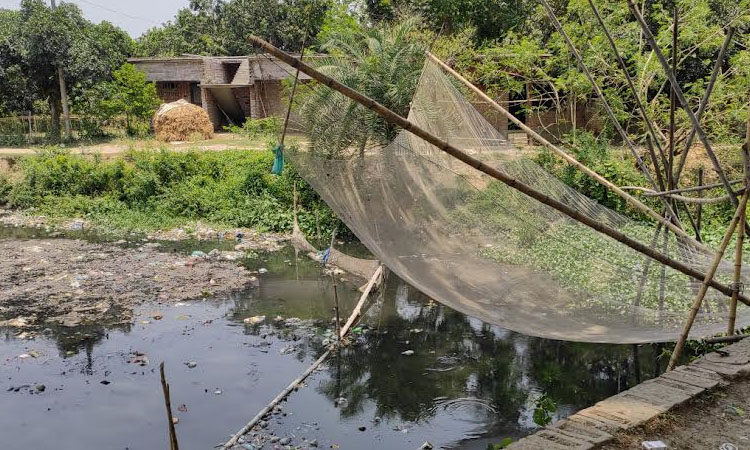News Flash
News Flash

RAJSHAHI, Sept 25, 2025 (BSS) - Time-fitting measures, particularly wastewater treatment plants, can be the crucial means for protecting the Barnoi river from pollution.
Due to the lack of a sewage system, the liquid waste produced from households, hotels, restaurants, public and private institutions and industrial factories is discharged into the River Barnoi through drains.
Mozaffar Hossain, a teacher of Durgapur Harirampur School and College, said, “The Biodiversity of the River Barnoi has been completely destroyed by toxic effluents of the city corporation. Now there are no fish in the river.”
Prof Mizanur Rahman of Geography and Environmental Science Department of Rajshahi University (RU), tested five types of industrial effluents with 22 parameters, and found that the effluents emitted by industrial factories are highly polluted.
He also tested the drain water, and the soil of the agricultural land adjacent to the River Barnoi, and found the existence of heavy metal content.
“The soil samples were collected and sent to the laboratory of the Soil Resource Development Institute in Dhaka. After testing, severe presence of heavy metals such as zinc, copper, iron, manganese, chromium, cadmium and lead were found in the soil,” he said.
Prof Mizanur said that the waste of 200 industries in Bangladesh Small and Cottage Industries Corporation (BSCIC) should be treated through an effluent treatment plant (ETP).
Samples of drain water and soil from agricultural land in South Nowdapara of Rajshahi city were collected, and sent to the Rajshahi centre of the Bangladesh Council of Scientific and Industrial Research for testing.
Test result showed the level of water pH to be 6.89, conductivity 1,270, dissolved oxygen level 1.20, calcium carbonate 325, alkalinity 518, fluoride 1.92, chloride 84.83, nitrate 1.95, and sulphate at 4.9 – exceeding the normal level of all components.
Analysing the results, Prof Redwanur Rahman of Institute of Environmental Science at RU said that there is an abnormal decrease and increase in basic elements in the water. It has turned into a liquid poison, posing a serious threat to the community.
Effluent from Rajshahi city has been a serious threat to the local water bodies including the Barnoi River, causing serious environmental pollution and affecting the health of local people.
If necessary measures are not taken immediately, the situation may worsen, predicted environment specialists.
Concerned sources said, the effluent of the city flows through the Cityhaat drain, Duary canal and Baya Bazaar canal and finally falls into the Barnoi River.
The farmers and the fishermen are getting affected with different water-borne diseases after they come in contact with the water mixed with toxic waste.
Besides, the production of fishes at different water bodies has also suffered setbacks, local fishermen informed.
Sultanul Islam, a fisherman at Halderpara area of Nawhata in the city, said, "We maintain our livelihood mainly through fishing at different open water bodies. But now the production of fish has reduced to a drastic level since the water here has become polluted. As a result, we are incurring financial losses."
Abdur Razzak, another fisherman at Barnoi riverbank area said, "I used to catch fish from the water bodies here but now the fish reserve at the local water bodies has come down to an alarming level and I am not getting fishes in my net. Now I am passing days in hardship. I urge the concerned authority to take immediate measures in this connection."
Researcher of rivers in Rajshahi Mahbub Siddiqui said, "The wastage of the city contains various harmful elements that cause environment pollution and affect the human body seriously after they use the polluted water for different purposes."
Solid and liquid waste is being dumped into the Barnoi River.
He also said they informed the matter to the RCC authority, but no measures have been taken yet. Mahbub Shiddque said the Rajshahi City Corporation (RCC) has no proper waste management system and so the problem is mounting day by day.
Disseminating his expertise Prof Bidhan Chandra Das said the wastages of RCC have been causing serious water pollution for long. The farmers here use this polluted water for different purposes and they are getting affected with different water borne diseases.
It is a matter of regret that the authority concerned has not taken any steps in this connection yet, he added.
Sources close to the Rajshahi City Corporation (RCC) said 450 tonnes of dry waste are produced daily in the summer season from households, markets, hotels and restaurants, public and private institutions and roads. The amount of waste is measured at 350 tonnes in the winter season.
The waste is collected at 28 points in the city, and dumped by trucks in the City hat landfill under Paba upazila, on the outskirts of the city, without any treatment.
Consequently, during the monsoon, the waste is washed away and falls directly on the agricultural land and the River Barnoi.
Sheikh Muhammad Mamun, Chief Conservation of RCC, said that modern drainage management has already been developed in the city corporation area in three phases through a master plan.
Now, efforts are being made to provide fresh water to farmers by refining liquid waste through water waste management. Also, medical waste is incinerated through ETP before dumping.
He added that an integrated waste management plan has been undertaken by the local government and the engineering department to turn dry waste into a resource through ETP.
"A Tk 1,500 crore project plan by the city corporation has been proposed to the government to turn waste into resources through management."
Mentioning that a plan has been undertaken with the help of UNICEF for sanitation, Mamun added, "If the projects are implemented within the next year, the city corporation will become a modern waste management city."